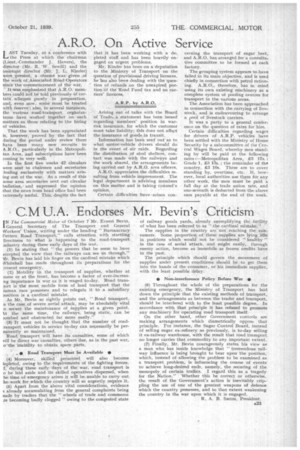C.M U.A. Endorses Mr. Bevin's Criticism
Page 25

If you've noticed an error in this article please click here to report it so we can fix it.
I N The Commercial Motor of October 7 Mr. Ernest Bevin, General Secretary of The Transport and General Workers Union, writing under the heading " Bureaucracy Fetters Road Transport," calls attention with startling Erectness to what is happening to the road-transport ,ndustry during these early days of the war. (1) In stating that " the powers that be seem to have iccepted the view that the railways can see us through," qr. Bevin has laid his finger on the cardinal mistake which Whitehall has made throughout its preparations for the iresent emergency. (2) Mobility in the transport of supplies, whether at iome or at the front, has become a factor of ever-increasng importance in war as it is waged to-day. Road transJort is the most mobile form of land transport that the mman race possesses and to relegate it to a subsidiary iosition is a cardinal mistake, As Mr. Bevin so rightly points out, " Road transport, n the case of severe aerial attack, may be absolutely vital :o secure the maintenance of supplies at a given point. it the same time, the railways, being static, can, be >omtied and obstructed far more easily." • (3) It must not be thought that the number of roadTansport vehicles in service to-day can necessarily be pernanently so maintained. Road transport will have its casualties, some of which vill be direct war casualties, others due, as in the past war,
o 'the 'inability to obtain spare1 parts.
,. • Road' Transport Must be Available • (4) Moreover,. skilled personnel will also become lepleted, owing to the requirements of the fighting forces, during these early days of the' war, road transport is o be laid aside and its skilled operatives dispersed, when he titne of emergency arises it will be unable to carry out he work for which the country will so urgently. require it.
(5) Apart from the above vital considerations, evidence s already accumulating from the general complaints being nade by traders that the " wheels of trade and commerce re becoming badly clogged" owing to the congested state of railway goods yards, already exemplifying the futility of what has been referred to as " the cardinal mistake." .
The supplies in thecOuntry are not reaching the consumers. Some proportion of 'these supplies are lying idle in poSitions which would not be considered " healthy " in the case of aerial attack, and might easily, through enemy action, become as immobile as frozen' credits have in the past.
The principle which should govern the movement of supplies under present conditions should be to get them into the hands of the consumer, or his immediate supplier, with the least possible delay.
• Non-interference Policy Before War • (6) Throughout the whole of the preparations for the existing emergency, the Ministry of Transport has laid clown the principle that the existing methods of transport, and the arrangements as between the trader and transport, should he interfered with to the least possible degree. In accordance with that principle it has refused to promote any machinery for operating road transport itself.
On the other hand, other Government controls are making arrangements which diametrically oppose that principle. For instance, the Sugar Control Board, instead of selling sugar ex-refinery as previously, is to-day selling it ex-railway warehouse, with the result that road transport no longer carries that commodity to any important extent.
(7) Finally, Mr. Bevin courageously states his view as a man, who has inside knowledge that "tremendous railway influence is being brought to bear upon the position, which, instead of allowing the problem to be examined as a transport problem, is influencing the course of events to achieve long-desired ends, namely, the securing of the monopoly of certain traffics. I regard this as a tragedy for the Nation." Whether this be correct or otherwise, the result of the Government's action is inevitably crippling the use of one of the greatest weapons of defence which the country possesses, and to that extent weakening the country in the war upon which it is engaged. R. A. B. SMITH, President. A23




















































